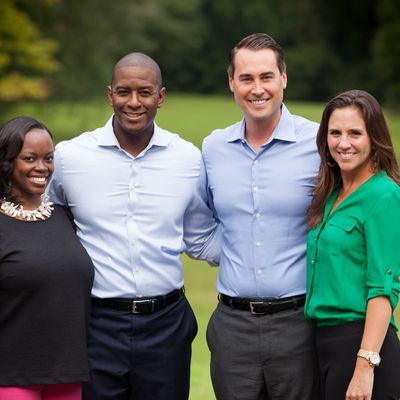
As in 17 other states, Florida’s candidates for governor choose a running-mate (for lieutenant governor) after they win their party primaries. In competitive elections, that typically means that they, like presidential candidates, choose a future second-in-command based on strategic considerations such as party unity, campaign financing needs, and geographical, ideological, racial/ethnic or gender balance.
In what is expected to be a very close general election, Florida’s gubernatorial nominees went in different directions. Republican congressman Ron DeSantis chose veteran state legislator Jeanette Núñez of Miami, achieving gender, ethnic (Núñez is Cuban-American) and geographical (DeSantis is from North Florida) balance. Democrat Andrew Gillum, who is mayor of Tallahassee, went with a relatively obscure fifth-place finisher in his own party’s primary, Orlando businessman Chris King.
It is not, however, so easy to discern Gillum’s strategic calculation in choosing King. His hometown paper, the Tallahassee Democrat, suggests a “doubling down” strategy, like Bill Clinton’s famous decision to go with fellow southern moderate baby-boomer Al Gore in 1992:
Gillum’s selection of Chris King was almost as startling as the mayor’s victory in the primary. King, a total political newcomer, ran for governor himself – finishing fifth in the primary with just under 2.5 percent of the vote. He has no record in public office to recommend him, or for the Republicans to attack, but some of the things King advocates – like abolishing capital punishment and slapping a tax on bullets – made him the only candidate in the race farther left than Gillum.
But he’s young, 39, and will appeal to the millennials, liberals and youthful idealists Gillum needs, to become Florida’s first black governor. And King fits well with the new and different image Gillum cultivates. Like insurgent newcomers Ayanna Pressley in Boston and Alexandria Ocasio-Cortez in New York, who ousted Democratic congressional members in their primaries, Gillum is not trying to appeal to the safe center. He’s counting on a new breed of voters who believe making college tuition-free, providing Medicare for all, and imposing gun control are not so scary.
But at The New Republic, Mark Pinsky and Loraine O’Connell, two writers based in King’s hometown, argue that the key to his selection is his “Christian progressive” self-identification, which could help Gillum win over a small but crucial share of white Evangelical voters:
King is also a lifelong, evangelical Christian: In high school, he belonged to the Fellowship of Christian Athletes; at Harvard, he was affiliated with Campus Crusade for Christ. Now, he is an elder at the nondenominational, evangelical church where the family worships in Orlando. His mother-in-law is a religious broadcaster with Good Life Broadcasting’s WTGL-TV Channel 45 in Lake Mary….
As Gillum and King look to draw out contrasts with their opponent, religion could help them campaign for a more compassionate government that helps the poor, the disenfranchised, immigrants, people with disabilities, and the unemployed. “King’s unusual combination of religion and progressivism could make him more palatable to some voters,” said Donald Davison, a political scientist at Rollins College in Winter Park.
This notion reflects the age-old longing in some circles for the resurrection of a Christian Left to do battle with the Christian Right, along with the belief that monolithic conservative Evangelical support for the Republican Party is largely attributable to the refusal of Democrats to speak in the language of faith. But conservative Evangelical opinion-leaders have so intertwined political and religious values and goals that the very idea of a “Christian progressive” is treated as an oxymoronic abomination. King “unequivocally supports abortion rights and fully funding Planned Parenthood.” That position alone would make him a fake Christian — much like the churchgoing Hillary Clinton — in the eyes of many conservative Evangelicals, or at least their leadership.
To be fair, there has always been a small but hearty share of white Evangelicals who reject the capture of their churches by the conservative movement and the GOP, and there are also less-observant folk who self-identify as Evangelicals but don’t follow the political instructions of clergy or televangelists. If enough of them hear King and decide Democrats are not after all living in a different moral and metaphysical universe from them after all, it might make a difference in a very close election.
But in any event, the Florida gubernatorial contest is now a fascinating political experiment on multiple levels. With his upset primary win, Andrew Gillum is already halfway home (along with Stacey Abrams of Georgia and Beto O’Rourke of Texas) to shattering many old assumptions about how a Democrat can win statewide office in the more diverse corners of the former Confederacy. If he wins with a “Christian progressive” running mate and boosts Democratic performance among white Evangelicals, that will be a lesson worth pondering as well. But first we will have to figure out whether it was the “Christian” or the “progressive” dimension of King’s identity that made the difference.






























